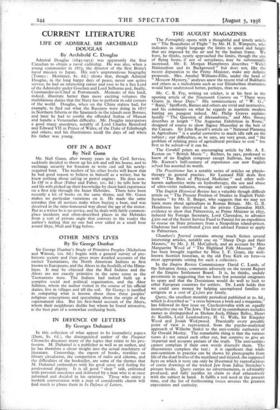THE AUGUST MAGAZINES
The Fortnightly opens with a thoughtful and timely article on " The Boundaries of Flight " by Mr. H. E. Wimperis, who indicates in simple language the limits to speed and height that are imposed by the air and by the human frame. We have, he thinks, nearly approached the limits; though the size of flying boats, if not of aeroplanes, may be substantially increased. Mr. E. Morgan Humphreys describes " Welsh Nationalism and its Background " but does not, like the recent deputation to the Prime Minister, make any definite proposals. Mrs. Amabel Williams-Ellis, under the head of " Moscow Mystery," analyses anew the recent trial of Bukharin and others as a melodrama such as our Elizabethan dramatists would have understood better, perhaps, than we can.
Mr. C. B. Fry, writing on cricket, is at his best in the opening article of the Nineteenth Century on " There were Giants in those Days." His reminiscences of " W. G.," " Ranji," Spofforth, Barnes and others are vivid and instructive, and his comments on what he regards as inartistic modern batting are pungent indeed. Mr. Philip Graves explains lucidly " The Question of Alexandretta," and Mrs. Strong describes at length " The Augustan Exhibition in Rome," designed of course to show Signor Mussolini as the heir of the Caesars. Sir John Russell's article on " National Planning in Agriculture " is a useful corrective to much idle talk on the subject ; our difficulties, as he says, are very great, and " the problem of relating price of agricultUral produce to cost " has first to be solved—if it can be.
The Cornhill prints an encouraging article by Mr. A. E. Keeton on " British Music " ; Richter, he says, professed to know of no English composer except Sullivan, but within Mr. Keeton's half-century of experience our new English school has asserted its worth.
The Practitioner has a notable series of articles on physio- therapy in general practice. Sir Leonard Hill deals first with " The Basis of Physical Medicine " and other well- known authorities write on hydrotherapy, the use and abuse of ultra-violet radiation, massage and cognate subjects.
The English Historical Review has a valuable though difficult article on " The Present Position of Studies in English Field- Systems " by Mr. E. Barger, who suggests that we may yet learn more about agriculture in Roman Britain. Mr. G. Henderson has discovered in the private Clarendon MSS. evidence to show that Palmerston, as Prime Minister in 1855, induced his Foreign Secretary, Lord Clarendon, to advance L500 out of the Secret Service Fund to Panir7i for an expedition to rescue six State prisoners from a Neapolitan island-prison. Gladstone had contributed £m° and advised Panizzi to apply to Palmerston.
Chambers's Journal contains among much fiction several interesting articles, notably one on " Sheep Dogs and their Masters," by Mr. J. H. McCulloch, and an account by Miss Marguerite Wood of " The Highland Folk Museum ' that has been brought together by Miss I. F. Grant, the well- known Scottish historian, in the old Free Kirk on Iona—a most appropriate setting for such a collection.
In the Empire Review Commiisioner David C. Lamb, of the Salvation Army, comments adversely on the recent Report of the Empire Settlement Board. It is, he thinks, unduly pessimistic in suggesting that we have few potential emigrants to spare and that the Dominions would do well to look to other European countries for settlers. Dr. Lamb holds that we could save money by helping unemployed families to emigrate at a cost of £1,000 per family.
Query, the excellent monthly periodical published at 2S. 6d., which is described as " a cross between a book and a magazine " has followed its first issue on Czechoslovakia with an equally instructive one on The Jews. The list of 29 contributors includes names as distinguished as Sholem Asch, Hilaire Belloc, Henri de Kerillis, Lord Londonderry, H. G. Wells, Sir Kingsley Wood and Josiah Wedgwood. Practically every possible point of view is represented, from the psycho-analytical approach of Wilhelm Stekel to the anti-semitic outbursts of Sir Oswald Mosley. The remarkable thing is that the various views d ) not cancel each other out, but contrive to give an impartial and accurate picture of the truth. The anti-semites cannot complain if their own words discredit them. The illustrations complete the text ; it is significant that while anti-semitism in practice can be shown by photographs from life of the dead bodies of the mutilated and injured, the supposed facts on which it rests can only be illustrated by reproductions of comic drawings of the wicked Jew from Julius Streicher's picture books. Query carries no advertisements, is adthirably produced, and fully justifies its claim to deal exhaustively with the subject in hand. It fulfils a real need at the present time, and the list of forthcoming issues arouses the greatest expectation and curiosity.


































 Previous page
Previous page